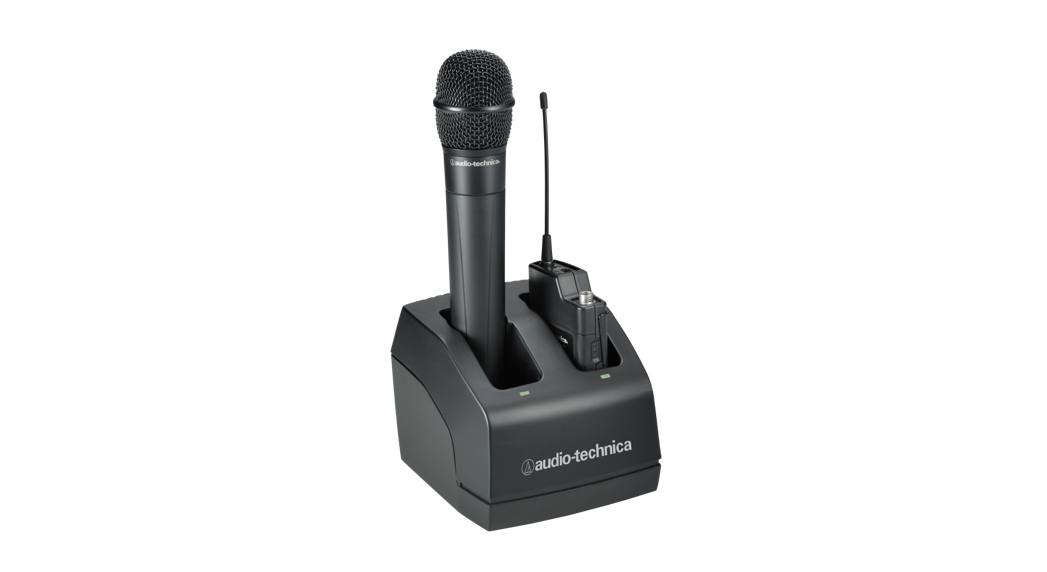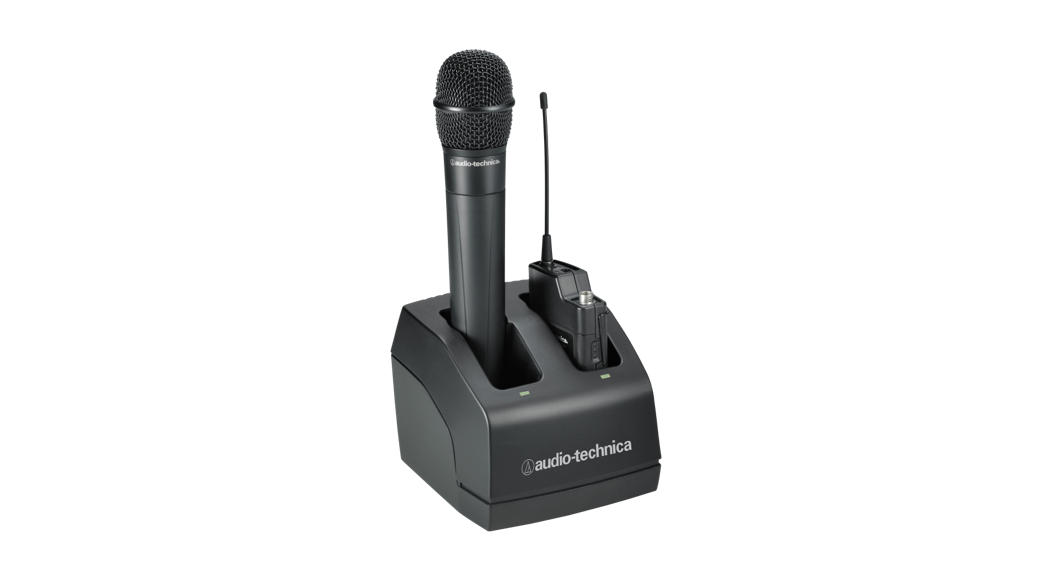![]()
ATW-CHG2Two-Bay Recharging Station


For use with 2000 Series wireless transmitters:ATW-T210a UniPak® TransmitterATW-T220a Handheld Transmitter
DANGERThis charger is designed only for Ni-MH rechargeable batteries.To avoid personal injury and damage, do not attempt to charge alkaline batteries or any other rechargeable batteries besides Ni-MH.
WARNING
- To prevent fire or shock hazards, do not expose this product to drips or splashes.
- To prevent fire, do not place any naked flame sources (such as lighted candles) on the product.
- To prevent fire, do not cover the ventilation of product with newspaper, tablecloths, curtains, etc.
- Do not install this product in a confined space such as a bookcase or similar unit.
- Do not open the cover. No user-serviceable parts inside.
- Do not place any objects filled with liquids, such as vases, on the product.
CAUTION
- Do not use the charger in extremely cold or hot conditions.
- Keep the charger out of reach of small children.
- The danger of explosion if the wrong type of batteries is used.
- The charger rating label is on the bottom of the apparatus.
- Replace batteries only with the same or equivalent type.
- The charger should be located close enough to the AC outlet so that you can easily grasp the AC adapter at any time. In case of emergency, disconnect the AC adapter quickly.
- Do not expose batteries or chargers to excessive heat such as direct sunlight, fire, or the like.
RECYCLING OF NI-MH BATTERIES
- Do not dispose of the batteries as unsorted municipal waste; use separate collection facilities.
- Contact your local government for information regarding the collection systems available.
To reduce the environmental impact of a multi-language printed document, product information is available online at www.audio-technica.com in a selection of languages.Afin de reduire (‘impact sur l’environnement de (‘impression de plusieurs, les informations concernant les produits sont disponibles sur le site www.audio-technica.com dans une large selection de langue.Para reducir el impacto al medioambiente, y reducir la producci6n de documentos en varios leguajes, nformaci6n de nuestros productos ester) disponibles en nuestra pagina del Internet: www.audio-technica.com.Para reduzir o impacto ecologico de um documento impresso de varies linguas, a Audio-Technica providenc a as informacties dos seus produtos em diversas linguas na www.audio-technica.com.Per evitare l’impatto ambientale the la stampa di questo documento determinerebbe, le informazioni sui prodotti sono disponibili online in diverse lingue sul sito www.audio-technica.com.Der Umwelt zuliebe finden Sie die Produktinformationen in deutscher Sprache and weiteren Sprachen auf unserer Homepage: www.audio-technica.com.Om de gevolgen van een gedrukte meertalige handleiding op het milieu to verkleinen, is productinformatie in verschillende talen “on-line” beschikbaar op: www.audio-technica.com.
CANADA ONLYThis Class B digital apparatus complies with Canadian ICES-003. Cet appareil numerique de la classe B est conforme a la norme NMB-003 du Canada.
OPERATING PRECAUTION
Battery Charger
- It is not abnormal for the charger and the rechargeable batteries to become warm during recharging.Batteries
- For best performance and optimal safety, use only the included 1900 mAh Ni-MH or similar type batteries.
- It is often necessary to cycle new or deeply discharged Ni-MH batteries two or three times before they reach peak performance. To cycle the batteries, simply use them as you normally would and then recharge them.
COMPLIANCE WITH FCC RULES (USA ONL Y)This device complies with Part 15 of FCC rules. Operation is subject to the following two conditions: (1) this device may not cause harmful interference, and (2) this device must accept any interference received, includinginterference that may cause undesired operation.
FCC WARNINGYou are cautioned that any changer or modification not expressly approved in this manual could void your authority to operate this equipment.
NOTICEThis equipment has been tested and found to comply with the limits for a Class B digital device, pursuant to Part 15 of the FCC Rules. These limits are designed to provide reasonable protection against harmful interference in a residential installation. This equipment generates, uses, and can radiate radio frequency energy and, if not installed and used in accordance with the instructions may cause harmful interference to radio communication. However, there is no guarantee that interference will not occur in a particular installation. If this equipment does cause harmful interference to radio or television reception, which can be determined by turning the equipment off and on, the user is encouraged to try to correct the interference by one or more of the following measures;– Reorient or relocate the receiving antenna.– Increase the separation between the equipment and receiver.– Connect the equipment into an outlet on a circuit different from that to which the receiver is connected.– Consult the dealer or an experienced radio/TV technician for help.
ATW-CHG2 Features
- Batteries are charged within the transmitters.
- The versatile unit charges ATW-T220a handheld transmitters and/or ATW-T210a UniPak® transmitters (in any combination).
- Built-in safety feature monitors cell voltage and automatically turns off the unit if problems are detected.
- Automatic shut-off if alkaline (non-rechargeable) batteries are installed.
- Automatic shut-off if damaged batteries are installed.
- Maintenance charging prevents battery self-discharge until the transmitter is removed from the charger.
- Includes Ni-MH rechargeable batteries – 2 x AA 1900 mAh
How to charge
- Connect the AC adaptor.
- Set the transmitter’s power switch to the off position.(Note: The transmitter’s power is automatically turned off if the transmitter is set in the charger with its power switch on; in this case, the transmitter will resume operation when it is removed from the charger.)
- Install the Ni-MH AA batteries in the transmitter, observing correct polarity as marked inside the transmitter. For installation instructions, see the 2000 Series installation & operation manual.
- Insert the transmitter into the charger with transmitter charging contacts facing toward the charger’s contact pins.
- Power is supplied to the charging bay when the transmitter is set into the unit; at this point the red indicator of each portlights.(Note: If the red indicator does not light, poor contact may be the cause; set the transmitter in the charger again.)
- When the charge is completed, the red indicator is turned off.(Note: Maximum charging time is about ten hours.)
- The unit keeps charging with ultra-low current (maintenance charge) until the transmitter is removed from the charger.
LED Status Indication
| Charger indicatorstatus | Chargingstatus | Transmitterstatus |
| Off | Power off | Transmitter not in unit |
| Red light | Charging* | Transmitter in unit |
| Red flashing | Charging error(Charging is stopped) | Transmitter in unit |
| Off | Charging is finished(Still maintenance charging) | Transmitter in unit |
Note: Red flashing light (charging error) is caused by use of alkaline (non-rechargeable) or damaged battery.*Note: If a transmitter with fully charged batteries is placed in the charger, the red light will remain on for a minimum of 3 hours, even though the batteries are fully charged.
Specifications*
| Input Rating | 12V DC, 320 mA (maximum) |
| Output Rating | 3.2V DC, 320 mA x2 |
| Charging Time | Approx. 10 hours (1900 mAh Ni-MH) |
| Operating Temperature | 0~+40º C |
| Dimensions | Approx. 131.0 mm (5.16″) W x 130.0 mm (5.12″) D x 105.0 mm (4.13″) H |
| Weight | Approx. 40 g (1.4 oz) |
*Specifications are subject to change without notice.
To reduce the environmental impact of a multi-language printed document, product information is available online at www.audio-technica.com in a selection of languages.![]()
![]()
![]()
References
[xyz-ips snippet=”download-snippet”]

